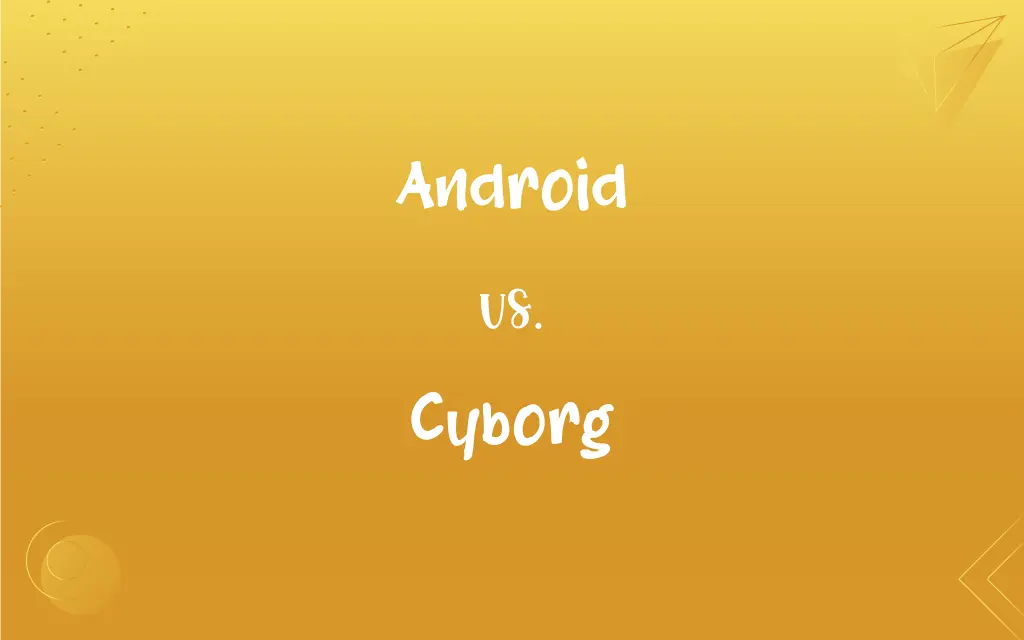Android vs. Cyborg: What's the Difference?
Edited by Janet White || By Harlon Moss || Published on November 26, 2023
Android refers to a robot designed to resemble a human. Cyborg refers to a being with both organic and biomechatronic body parts.

Key Differences
Androids are entirely artificial, designed to mimic human appearance and behavior, but lack organic components. While, cyborgs are part human, part machine, with organic and artificial components integrated into one entity.
The purpose of an android is to replicate human actions and appearance, often for interaction in human environments. However, cyborgs enhance or restore human capabilities by integrating technology into the biological body.
Androids are often depicted in science fiction as autonomous robots with advanced AI. Whereas, cyborgs represent the fusion of human and machine, often to overcome physical limitations or enhance abilities.
In terms of creation, androids are built from scratch using mechanical and electronic components. In contrast, cyborgs originate as humans and are augmented with technological implants or modifications.
The concept of an android emphasizes artificial intelligence and robotics. Cyborgs emphasize the enhancement or supplementation of biological organisms with mechanical elements.
ADVERTISEMENT
Comparison Chart
Composition
Entirely artificial
Combination of organic and artificial
Purpose
Mimic human appearance and behavior
Enhance or restore human capabilities
Origin
Built from mechanical components
Human base with technological augmentations
Role in Fiction
Autonomous, AI-driven robots
Fusion of human and machine
Emphasis
Artificial intelligence and robotics
Integration of technology and biology
ADVERTISEMENT
Android and Cyborg Definitions
Android
Human-like robot.
The android was designed to interact with people.
Cyborg
Restorative technology.
A cyborg may have implants to restore lost senses.
Android
Artificial intelligence.
Advanced AI enables the android to learn and adapt.
Cyborg
Human-machine hybrid.
The cyborg had an artificial limb that enhanced strength.
Android
Robotics marvel.
The android represented a breakthrough in robotics technology.
Cyborg
Enhanced abilities.
The cyborg's endurance surpassed that of ordinary humans.
Android
Synthetic appearance.
The android had a lifelike synthetic skin.
Cyborg
Biomechatronic enhancement.
The cyborg's eyesight was augmented with a digital implant.
Android
Mechanical human mimic.
The android's movements resembled those of a human.
Cyborg
Technologically augmented human.
The cyborg could interface with computers directly.
Android
Possessing human features.
Cyborg
An organism, often a human, that has certain physiological processes enhanced or controlled by mechanical or electronic devices, especially when they are integrated with the nervous system.
Android
A mobile robot or automaton, especially one that resembles a human.
Cyborg
(scifi) A being which is part machine and part organic.
Android
A robot that is designed to look and act like a human being (not necessarily a male one).
Cyborg
A human, animal or other being with electronic or bionic prostheses.
Android
Possessing human qualities.
Cyborg
(scifi) To convert (something) into a cyborg.
Android
Of the pelvis, having a narrow anterior segment and a heart-shaped brim, typically found in the male.
Cyborg
A human being whose body has been taken over in whole or in part by electromechanical devices;
A cyborg is a cybernetic organism
Android
A machine or automaton in the form of a human being.
Android
Resembling a man.
Android
An automaton that resembles a human being
FAQs
Can androids think like humans?
Androids may mimic human thought processes but don't have consciousness.
Can anyone become a cyborg?
Technically, with the right technology, anyone could become a cyborg.
How do cyborgs impact society?
Cyborgs raise ethical and societal questions about human enhancement.
What defines an android?
An android is a robot designed to resemble and behave like a human.
Are all robots androids?
No, only robots designed to look and act human are androids.
What is a cyborg?
A cyborg is a being that combines organic and biomechanical parts.
How advanced is android technology?
Android technology is continually advancing, especially in AI.
Do androids have emotions?
Androids can simulate emotions but don't experience them.
Are cyborgs considered human?
Cyborgs are still human but with technological enhancements.
What purposes do cyborgs serve?
Cyborgs can serve to enhance abilities or restore lost functions.
Do androids have a consciousness?
Currently, androids do not possess consciousness.
Can androids learn and adapt?
Advanced androids can learn and adapt to new situations through AI.
What legal rights do cyborgs have?
Cyborgs, being human at the base, have the same legal rights as humans.
Are there androids in real life?
While not as advanced as in fiction, basic androids do exist in research.
Is AI necessary for an android?
AI is a core component of androids to enable human-like interactions.
What are common cyborg enhancements?
Common enhancements include limb replacements and sensory augmentations.
What materials are used to build androids?
Androids are typically built from metals, plastics, and synthetic materials.
How do cyborgs differ from amputees with prosthetics?
Cyborgs have integrated technological enhancements; prosthetics are external aids.
Can cyborg technology reverse paralysis?
In some cases, cyborg technology can help overcome paralysis.
Are cyborg enhancements permanent?
Some are permanent, while others might be removable or upgradeable.
About Author
Written by
Harlon MossHarlon is a seasoned quality moderator and accomplished content writer for Difference Wiki. An alumnus of the prestigious University of California, he earned his degree in Computer Science. Leveraging his academic background, Harlon brings a meticulous and informed perspective to his work, ensuring content accuracy and excellence.
Edited by
Janet WhiteJanet White has been an esteemed writer and blogger for Difference Wiki. Holding a Master's degree in Science and Medical Journalism from the prestigious Boston University, she has consistently demonstrated her expertise and passion for her field. When she's not immersed in her work, Janet relishes her time exercising, delving into a good book, and cherishing moments with friends and family.






































































